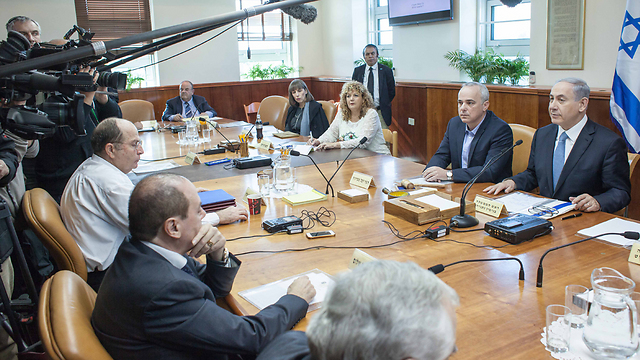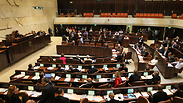This week, the Knesset was formally dispersed and elections were set for March 17, 2015.
In the space of the Jewish state’s 66 years, Israelis will be voting for their 20th Knesset. Since 1990 alone, there has been on average an election called every 2.8 years. Elections are, generally, required to be held every four years.
Israel cannot afford to be like Italy, which has churned out a staggering 64 governments in 68 years since the end of World War II. Unlike Italy, Israel does not have the luxury of Switzerland, Austria and Slovenia as our neighbors. We have Hamas, Hezbollah, Syria and Iran to contend with.
In Israel’s case, a stable government is not just a goal to aspire to, but an absolute necessity for our long-term future.
This election alone is expected to cost approximately NIS 2 billion (about $500 million) to the Israeli tax payer. You do the math with how much of a difference NIS 2 billion could make to the education, health or defense budgets.
When it boils down to it, every significant policy decision affecting the citizens of Israel, and in many cases even Jews in the Diaspora – whether it is the conflict with the Palestinians or socio-economic issues – is made in the Knesset, the heart and soul of Israel’s democracy.
At the outset, we must be clear: Israel has one of the most vibrant and flourishing democracies in the world. In three months, Israelis will go to the polls to freely elect a new government, with a plethora of candidates from every political persuasion and without fear or intimidation. Our neighbors from across the Arab Middle East are fighting, and dying, for this very same right.
Yet for all its virtues, this very same electoral and governmental system is also utterly dysfunctional and the prime reason for the political paralysis we find ourselves in all too often.

In the current government, we had the absurd situation where the key portfolios of prime minister, foreign affairs, finance, justice and religious affairs were each held by members of different parties, often with vastly different policies. This is a recipe for disaster when senior members of the cabinet make public statements and frequently contradict the official government position (and each other). This is nowhere more destructive than on matters of national security.
Israel’s electoral system, which is based on nationwide proportional representation, also has one of the lowest electoral thresholds in the world, at 3.25%. One of the (few) electoral governance policies passed in the current government was to raise that from an even more pitiful 2%. The average for major democracies is 4-5%.
The low electoral threshold is also a major reason why, since the founding of the state, the power of every Israeli government has been dependent on assembling, and maintaining, fragile coalitions. With the shadow of elections always lurking, it is incredibly difficult to formulate and implement effective long-term policies when the main priority is keeping your coalition intact.
Then we have members of Knesset like Arab Israeli MKs Hanin Zoabi and Ahmad Tibi, who openly side with Hamas, incite violence against Israel and refuse to accept Israel’s right to exist as a Jewish state, even though they serve in the very Knesset of this state.
There are a host of other root causes that go to the heart of the systematic deficiencies with Israel’s electoral and governmental system, including:
- A lack of accountability, with individual Knesset members elected based on their position on a party list and not directly by the constituents.
- Insufficient separation of powers between the various government branches, which results in a lack of checks and balances and the absurdity of having MKs as part of the very legislature tasked with overseeing their own performance.
- Cabinet ministers appointed on the basis of back-room coalition deals, instead of on their skills and expertise in the field.
It is important to note, that in addition to raising the voting threshold, a number of other important electoral reforms were passed in the most current government, including reducing the number of ministers, removing the superfluous ‘Ministers without portfolio’ and limiting the equally pointless and time consuming ‘no-confidence’ votes.
These are all important achievements, but they barely scratch the surface of what is needed.
When the elected members of the Knesset cannot even agree on the most elementary of bills enshrining Israel as the nation-state of the Jewish people, that is a source of utter embarrassment.
Simply put, Israel needs a system of government that is stable, accountable and representative and that has sufficient checks and balances, while remaining free, open and robust.
We need less self-serving politicians who care more about staying in power and more elected officials willing to put the interests of the nation ahead of their own.
Israel’s current system of government may have been appropriate in 1948, when the state was founded. But it is long past its use-by date. No less than a paradigm change will suffice now.
Yes, Israel continues to produce stunning achievements, but this is despite and not because of the current system, which is only hampering further growth, development and good governance.
With Iran and a host of national security threats looming on the horizon and increasing demand for social and economic change at home, the time for electoral reform has never been more urgent.
What is necessary at this critical juncture is not just for the main parties to make this electoral reform a policy priority, but to engage in a nationwide grassroots campaign to highlight the importance of change and raise our politicians’ awareness of the need for reform.
Arsen Ostrovsky is an international human rights lawyer and freelance journalist based in Israel. He has also previously practiced constitutional law in Australia.
















